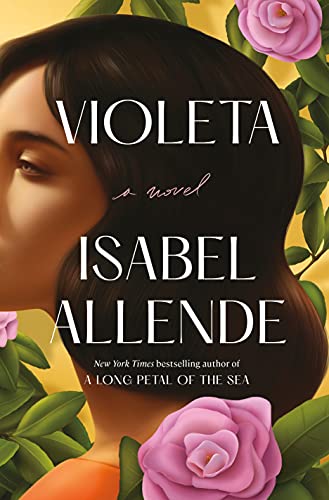
TEST
Has anyone ever chronicled (and added magic to) the lives of women with such grace and beauty as Isabel Allende? If you’ve read one of the author’s books you don’t need me to tell you what you’ll find between the beautiful covers of Violeta. Magical realism. And the story of one woman’s life and loves.
The book takes the narrative form of a letter written by Violeta Del Valle to Camilo, a person much beloved to her. Violeta was born in the middle of a great storm in 1920 and the Spanish flu pandemic, and now she is dying in the middle of the Covid-19 pandemic. The only daughter of her worn-out former beauty mother and controlled but loving businessman father, Violeta is ambitious. She has five brothers, one of whom is already in his mid-twenties by the time she is born. Her father dies in the midst of revolution and stock market crashes, Violeta finds his body and is traumatized forever, and a now-penniless Violeta and her sickly mother move to the countryside of Chile and the bosom of her mother’s family. With her father’s death the family splinters; Violeta becomes a teacher at thirteen, marries, moves to America and becomes an equal partner in her older brother’s construction firm. She subsequently tumbles into two important relationships; one staid and passionless, one passionate but led by an abusive, immature and manipulative man.
At this point in her career it’s almost impossible to critique Isabel Allende’s work; she has hit a mature stride that rings with confidence in Violeta. The novel does a lovely job chronicling the world Violeta inhabits and the people she loves and loathes. Allende, as always, paints a rich portrait of a period long gone. There are, as always, ghosts involved, together with the promise of healing. Many characters cross Violeta’s path and influence her life, and all of them are drawn well and richly. My favorite was Violeta’s independently minded bisexual Irish expat governess, Miss Taylor, who dispenses sensible advice that helps Violeta become an independent businesswoman.
Allende’s self-assured talent is on full display as always, and there’s never a falsely used word. The only complaint I have is that the novel sometimes falls into that women’s fiction trap of having every single disaster that could possibly happen to a cis woman happen to her protagonist. But Allende is so talented she effortlessly navigates these waters, and Violeta is a darn good novel.
Buy it at Amazon, Audible or your local independent retailer
Visit our Amazon Storefront
Grade: A-
Book Type: Fiction
Sensuality: Warm
Review Date: 30/01/22
Publication Date: 01/2022
Recent Comments …
Yep
This sounds delightful! I’m grabbing it, thanks
excellent book: interesting, funny dialogs, deep understanding of each character, interesting secondary characters, and also sexy.
I don’t think anyone expects you to post UK prices – it’s just a shame that such a great sale…
I’m sorry about that. We don’t have any way to post British prices as an American based site.
I have several of her books on my TBR and after reading this am moving them up the pile.





I just got this book! I’m not one to read literary fiction but the review sounded good and I read an excerpt and it hooked me. I hope I love it!
We do too!
Hope you like it!
Can’t see previous 3 comments???
Yes.
This was probably a better personal conversation. So, after discussion with all parties concerned, it was decided to pull it.
Appreciate the explanation!
It’s referred to as such in the marketing of the book and Allende (who is Chilean) refers to it by that term three times in the text, so you should probably take this up with Ballantine Books and the author. I’m well aware of the term’s origin point but I’m simply quoting Allende’s use of the phrase.
As an Actual Factual Latina, I know that calling it the Spanish Flu isn’t an optimal term and I personally prefer to refer to it as the 1918 flu pandemic, but it’s not that big of a deal compared to a million different microaggressions I and other Latin American folks experience on a daily basis. Like someone who’s not Spanish using a wikipedia citation to talk down to two brown people at the same time without even bothering to look at the book’s official blurb. Cough.
I didn’t think you thought we were ignorant, but I felt like you were condescending to me. Your apology is accepted.
I wouldn’t dare suggest you avoid commenting here anymore, or even to my reviews, but reacting with self-pity and pulling an “I love Latin American history, I have a Mexican daughter-in-law” when someone tells you you pulled an ally fail isn’t a good look. A simple “I’m sorry” would’ve sufficed. I understand you were trying to commit an act of allyship, but when you’re unintentionally hurt the people you’re trying to be supportive of, it’s best to simply listen to them.